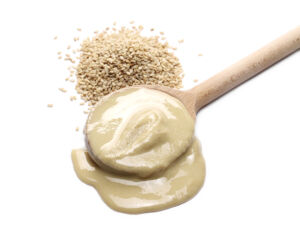Ingredients to Avoid for Sesame Seed Allergy
Sesame seed allergy has shown a marked increase in prevalence and severity across the U.S. This increase in IgE-mediated sesame seed allergies may be attributed to an increase in popular products that contain sesame seeds and sesame oil. In particular, a renewed focus on health has brought increased use of sesame seed oil and tahini (sesame seed paste), which is considered to be a healthy cooking oil and is heavily used in vegetarian dishes, salad dressings, and a wide range of Asian and Middle Eastern cuisine.

Sesame seed is not always easily recognizable in recipes and ingredients, since it can be listed under many different names across cultures. If you or someone you love is affected by a sesame allergy, take care to avoid the following ingredients:
-
- Benne, benne seed, and benniseed
- Gingelly and gingelly oil
- Gomasio (sesame salt)
- Halvah
- Sesame flour
- Sesame oil
- Sesame paste
- Sesame salt
- Sesame seed
- Sesamol
- Sesamum indicum
- Sesemolina
- Sim sim
- Tahini, tahina, and tehina
- Til
Many patients who suffer from sesame seed allergy do not have other food allergies, though emerging research shows some correlation between sesame seed allergy and other seed allergies. A 2016 study found that those with IgE-mediated reactions to sesame seed allergy may also cross-react to poppy seed, rye grain, tree nuts, peanut, and kiwi.
Foods That Commonly Contain Sesame Seeds
 Sesame seed is now officially listed as one of the top nine food allergens in the U.S. Food manufactured after January 2023 is legally required to include sesame on packaging, if it is included in the ingredients or produced in a facility with sesame present. This means that those with a sesame allergy should pay particular attention when consuming the following foods which may include sesame:
Sesame seed is now officially listed as one of the top nine food allergens in the U.S. Food manufactured after January 2023 is legally required to include sesame on packaging, if it is included in the ingredients or produced in a facility with sesame present. This means that those with a sesame allergy should pay particular attention when consuming the following foods which may include sesame:
-
- Asian cuisine
- Breakfast cereals
- Granola and muesli bars
- Candy
- Crackers
- Salad dressings
- Soups
- Sauces, gravies, and marinades
- Falafel
- Hummus
- Baba ganoush
- Bread crumbs
- Margarine
- Pasteli
- Goma-dofu
- Stir fry
- Flavored rice Noodles and risotto
- Shish kebabs
- Rice cakes
- Processed meat and sausage
- Sushi
- Vegetarian burgers
- Tempeh
- Baked goods (such as cakes, bagels, muffins, pastries, buns, and breads)
- Chips (including tortilla chips, pita chips, and bagel chips)
- Snacks (such as pretzels, protein bars, and trail mix)
Interestingly, sesame oil is also often used in cosmetics. This may include lip balms, soaps, lotions, ointments, moisturizing creams, and eye products. Sesame oil may even be used in pharmaceuticals, such as testosterone or progesterone injections and certain medications used to treat schizophrenia, among others. Those with a sesame seed allergy must be cautious when choosing these products to protect against accidental contact or ingestion.
Sesame Seed Allergy Treatment Options
Oral immunotherapy (OIT) has been shown to be a safe and effective treatment for sesame allergy. OIT minimizes reactions to contact with food allergens, protecting against accidental exposure and empowering patients to eat a balanced, full diet with confidence.
OIT works by gradually exposing the patient to small doses of allergens. Over time, this desensitizes the body and helps to retrain the immune system, decreasing adverse allergic reactions. For many people, OIT not only introduces a broader diet and decreases sensitivity, but it also provides dramatic improvements in overall quality of life. Patients are often happier, more confident, and experience significantly less stress about food allergies after undergoing OIT.
At Latitude, 92% of our patients who have undergone OIT have reached maintenance dosing for their allergens. Our experienced team provides oral immunotherapy to treat sesame allergy alone, or for patients who are allergic to multiple foods, we treat sesame alongside their other food allergies.


 Sesame seed is now officially listed as one of the top nine food allergens in the U.S. Food manufactured after January 2023 is legally required to include sesame on packaging, if it is included in the ingredients or produced in a facility with sesame present. This means that those with a sesame allergy should pay particular attention when consuming the following foods which may include sesame:
Sesame seed is now officially listed as one of the top nine food allergens in the U.S. Food manufactured after January 2023 is legally required to include sesame on packaging, if it is included in the ingredients or produced in a facility with sesame present. This means that those with a sesame allergy should pay particular attention when consuming the following foods which may include sesame: